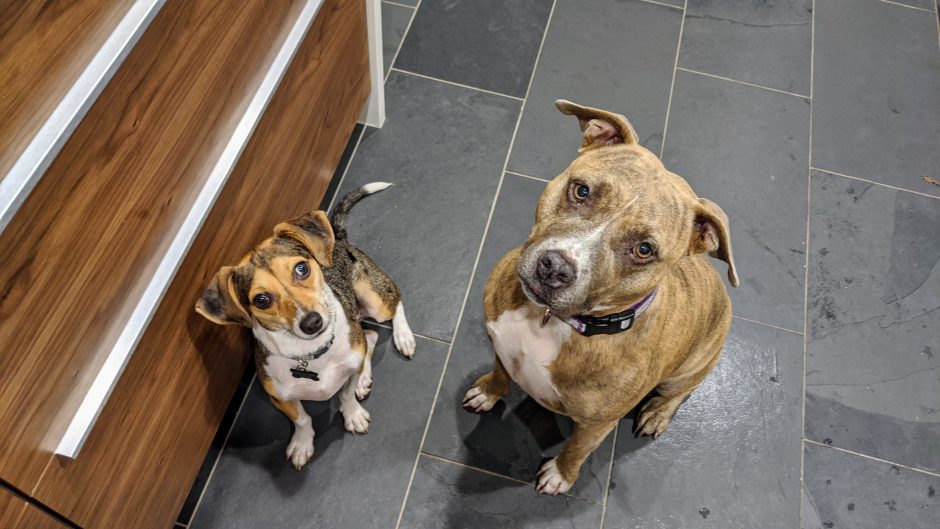
The New Extended Family: Pet Ownership During the Pandemic
An ongoing study highlights one PhD student’s work to address inequality in pet ownership
I have spent months now apologizing for two main things over Zoom — my poor internet connection and my pets screaming at me every time I hop on a call. For many of us, the switch to more time spent at home has meant a dramatic increase in quality time with our pets — in my case, spending every waking moment with an ungrateful cat who does not take kindly to office doors being shut.
JENNIFER APPLEBAUM, a PhD student in the Department of Sociology & Criminology and Law, the pandemic raises important sociological questions when it comes to people’s relationships with their companion animals. “Are pets actually helping people feel less lonely? Are they helping them have a more structured day?” she wondered.
To answer these questions, Applebaum, with the help of her mentor, sociology and criminology chair BARBARA ZSEMBIK, launched a survey on April 6 designed to gauge how owners feel about their pets during the quarantine. Combining closed and open-ended questions, the survey received 3,000 responses as of June 2020. Papers analyzing these results have since been published in several journals, including One Health and Animals, with more papers expected in the future.

Pets are usually considered to be family by their owners, but our systems think of them as property.
— Jennifer Applebaum
The returns suggest what you might expect: People are feeling more attached to their companion animals and leaning on them for support, but the pandemic also brought up some potentially troubling dilemmas. Around 10 percent of initial respondents marked they wouldn’t or might not enter the hospital for the coronavirus due to concern for the welfare of their companion animals. Applebaum notes this is, of course, just in theory — becoming infected with the virus might change their minds — but it speaks to the level of attachment people have to their animals, along with issues Applebaum has spent her career trying to shine a light on.
Prior to beginning her academic career, Applebaum worked in a front desk position at the Humane Society of North Central Florida where people would come in and attempt to surrender their pets. “It happened almost every day,” Applebaum said. “It was a last resort for them.” This sparked an interest in the inequalities present in pet ownership. As Applebaum notes, the majority of western countries view pets as true members of families, yet laws and policies treat them as property — like a car. This can lead to very difficult decisions and immense mental and emotional stress for those who are put in situations where they cannot provide for their animals and are forced to relinquish them.
“Pets are usually considered to be family by their owners, but our systems think of them as property,” Applebaum said. “This can complicate the experience of social inequalities, with adverse consequences for the whole household, when people and their pets aren’t supported together.” Domestic violence and homeless shelters might not allow pets on site, she explained, which might force people in need to avoid the shelters, exacerbating mental and financial strains. People who lack social and economic resources or a support network might avoid seeking medical attention as well. As stay-at-home orders went into effect across much of the nation in April, national reports noted an increase in pet adoption rates. With extra time added to our days, it makes sense that many would see this as an opportune time to adopt. Applebaum notes, though, that pet adoption can also add stress, either due to behavior or health issues in the pet or unforeseen financial hardships — especially considering the pandemic-induced high unemployment rates.
Applebaum is concerned that as the pandemic continues, shelters will see an increase in relinquished animals. The 2008 economic crisis brought on a nationwide uptick in pets being relinquished to animal shelters, she said, while adoption rates dropped. The pandemic is, of course, a unique situation, where both economic and health factors could make it difficult for owners to care for their pets. “Who is going to take care of pets if the primary caregiver becomes incapacitated?” she asked.

While pursuing her master’s degree at UF’s College of Veterinary Medicine, Applebaum served as the manager of the school’s Veterinary Community Outreach Program. The program works with rural shelters and treats animals that wouldn’t otherwise see veterinarians. At the time, veterinary students also served once a week at the St. Francis Pet Care Clinic in Gainesville, which provides primary non-emergency veterinary care and services to homeless or very low-income pet owners. This experience further highlighted for Applebaum how nationwide inequality is built into even adopting a pet. “Veterinary care is not accessible to a huge portion of pet owners,” she said.
During this master’s program, Applebaum conducted a research project where she used a geographic information system (GIS) to map animal intakes at Alachua County Animal Services, then overlaid these results with a map highlighting higher rates of poverty, family violence and Medicaid enrollment. After finding that there was a correlation between animal submissions and these specific areas, Applebaum interviewed people to find out why these two were lining up. While expected, it confirmed her suspicions that pets are not immune to the effects of living in impoverished communities.
As she continues to assess the incoming results on the quarantine survey, Applebaum also received a National Institutes of Health Doctoral Fellowship this spring. Partnering with PhD student Carlyn Ellison from the Department of Occupational Therapy and Rehabilitation Science at UF Health, Applebaum will examine how relationships with companion animals impact the health and well-being of older adults who are aging in place.
“I hope my work can inform the human side and the pet side,” Applebaum said. “The vast majority of pet owners consider their pets to be family members. This conceptualization of a family needs to include pets.”


